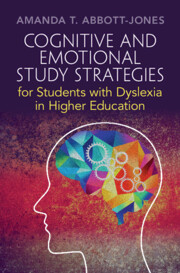Book contents
- Cognitive and Emotional Study Strategies for Students with Dyslexia in Higher Education
- Cognitive and Emotional Study Strategies for Students with Dyslexia in Higher Education
- Copyright page
- Dedication
- Contents
- Figures
- Preface
- Acknowledgements
- Preview of the Contents of the Book
- 1 Introductory Chapter: Dyslexia and Difficulties with Study Skills
- 2 Organisation Techniques and Meeting Deadlines
- 3 Note-Taking Strategies
- 4 Reading Strategies
- 5 Making Learning Memorable
- 6 Essay-Writing Strategies
- 7 Spelling Techniques
- 8 Revision and Examination Techniques
- 9 Presentation Techniques
- 10 Public Speaking, Interviews, Seminar Discussion and Debate Techniques
- 11 Emotional Coping Techniques and Looking After Your Wellbeing
- Epilogue
- References
- Index
10 - Public Speaking, Interviews, Seminar Discussion and Debate Techniques
Published online by Cambridge University Press: 14 September 2023
- Cognitive and Emotional Study Strategies for Students with Dyslexia in Higher Education
- Cognitive and Emotional Study Strategies for Students with Dyslexia in Higher Education
- Copyright page
- Dedication
- Contents
- Figures
- Preface
- Acknowledgements
- Preview of the Contents of the Book
- 1 Introductory Chapter: Dyslexia and Difficulties with Study Skills
- 2 Organisation Techniques and Meeting Deadlines
- 3 Note-Taking Strategies
- 4 Reading Strategies
- 5 Making Learning Memorable
- 6 Essay-Writing Strategies
- 7 Spelling Techniques
- 8 Revision and Examination Techniques
- 9 Presentation Techniques
- 10 Public Speaking, Interviews, Seminar Discussion and Debate Techniques
- 11 Emotional Coping Techniques and Looking After Your Wellbeing
- Epilogue
- References
- Index
Summary
If dyslexic learners have phonological difficulties combined with deficits in short term / working memory, this causes anxieties around any form of public speaking, such as delivering presentations, verbally contributing to seminar discussion and debate, and attending interviews. That is because these deficits impair the acquisition and production of spoken language and manifest word finding difficulties. Therefore, students that present with these problems would benefit from techniques used by their peers that help to deal with the anxiety connected to providing ideas verbally and would also help with combating any issues around speech production. As such, key techniques students with dyslexia say they use to deal with these obstacles, presented in the chapter, include preparation by using brief notes written in an ordered structure to guide verbalisation, using the method of asking questions to demonstrate critical thinking and to develop debate, using the multisensory method of hearing ideas spoken aloud during preparation stage, capturing these on a recording device, playing them back to hear, then jotting down keywords from the recording to take along to the seminar or interview to act as visual memory joggers.
Keywords
- Type
- Chapter
- Information
- Cognitive and Emotional Study Strategies for Students with Dyslexia in Higher Education , pp. 343 - 386Publisher: Cambridge University PressPrint publication year: 2023



